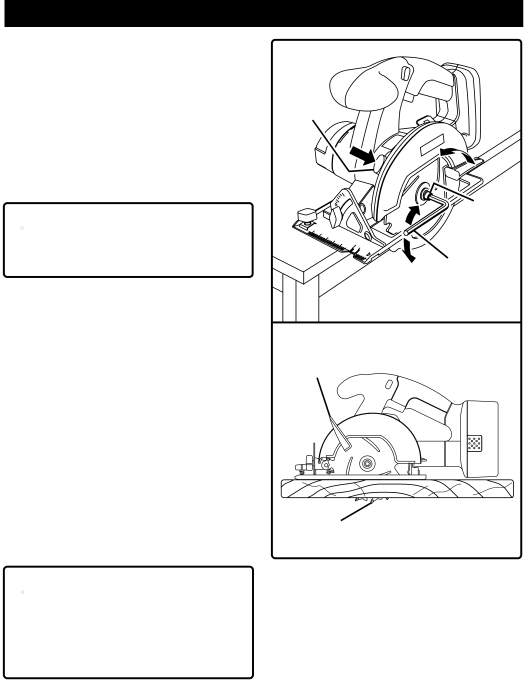
OPERATION
■Fit saw blade inside lower blade guard and onto spindle. NOTE: The saw teeth point upward at the front of saw as shown in figure 5.
■Replace outer blade washer.
■Depress spindle lock button, then replace blade screw. Tighten blade screw securely.
NOTE: Turn blade screw counterclockwise to tighten.
■Return blade wrench to storage area.
REMEMBER: Never use a blade that is too thick to allow the outer blade washer to engage with the flats on the spindle.
TO REMOVE BLADE:
■Remove battery pack from saw.
![]() WARNING:
WARNING:
Failure to remove battery pack from saw could result in accidental starting causing possible serious personal injury.
■Remove blade wrench from storage area. See Figure 1.
■Position your saw as shown in figure 6, depress spindle lock button, and remove blade screw.
NOTE: Turn blade screw clockwise to remove.
■Remove outer blade washer. See Figure 5.
NOTE: Blade can be removed at this point.
SAW BLADES
The best of saw blades will not cut efficiently if they are not kept clean, sharp, and properly set. Using a dull blade will place a heavy load on your saw and increase the danger of kickback. Keep extra blades on hand, so that sharp blades are always available.
Gum and wood pitch hardened on blades will slow your saw down. Use gum and pitch remover, hot water, or kerosene to remove these accumulations. DO NOT USE GASOLINE.
BLADE GUARD SYSTEM
The lower blade guard attached to your cordless circular saw is there for your protection and safety. It should never be altered for any reason. If it becomes damaged or begins to return slow or sluggish, do not operate your saw until the damage has been repaired or replaced. Always leave guard in operating position when using saw.
![]() DANGER:
DANGER:
When sawing through workpiece, lower blade guard does not cover blade on the underside of workpiece. Since blade is exposed on underside of workpiece, keep hands and fingers away from cutting area. Any part of your body coming in contact with moving blade will result in serious injury. See Figure 7.
SPINDLE
LOCK BUTTON
| 5 |
| BLADE |
| 5 |
|
|
| 40 |
|
|
3 |
| SCREW | |
2 | 0 |
| |
2 |
|
| |
3 |
|
|
|
2 |
|
|
|
| 1 | 45 |
|
|
|
| |
|
| 0 | BLADE |
|
| 1 | |
|
|
| |
WRENCH
Fig. 6
LOWER BLADE GUARD
IS IN UP POSITION
WHEN MAKING A CUT
BLADE EXPOSED ON
UNDERSIDE OF WORKPIECE
Fig. 7
Never use saw when guard is not operating correctly. Guard should be checked for correct operation before each use. If you drop your saw, check the lower blade guard and bumper for damage at all depth settings before reuse.
NOTE: The guard is operating correctly when it moves freely and readily returns to the closed position. If for any reason your lower blade guard does not close freely, take it to the nearest Authorized Service Center for service before using.
Page 11